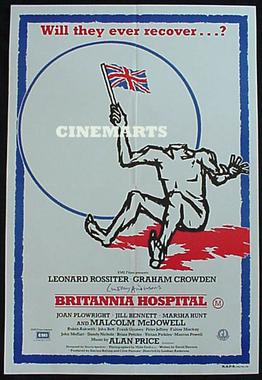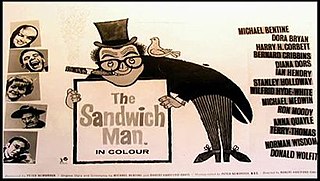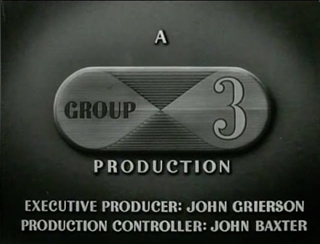Related Research Articles

The oldest known surviving film was shot in the United Kingdom as well as early colour films. While film production reached an all-time high in 1936, the "golden age" of British cinema is usually thought to have occurred in the 1940s, during which the directors David Lean, Michael Powell, and Carol Reed produced their most critically acclaimed works. Many British actors have accrued critical success and worldwide recognition, such as Audrey Hepburn, Olivia de Havilland, Vivien Leigh, Glynis Johns, Maggie Smith, Laurence Olivier, Michael Caine, Sean Connery, Ian Mckellen, Joan Collins, Judi Dench, Julie Andrews, Daniel Day-Lewis, Gary Oldman, Emma Thompson, Anthony Hopkins and Kate Winslet. Some of the films with the largest ever box office returns have been made in the United Kingdom, including the fourth and fifth highest-grossing film franchises.

The British Film Institute (BFI) is a film and television charitable organisation which promotes and preserves film-making and television in the United Kingdom. The BFI uses funds provided by the National Lottery to encourage film production, distribution, and education. It is sponsored by the Department for Culture, Media and Sport, and partially funded under the British Film Institute Act 1949.

William Gerald Douglas was a Scottish film director best known for the trilogy of films about his early life.

Mancunian Films was a British film production company first organised in 1933. From 1947 it was based in Rusholme, a suburb of Manchester, and produced a number of comedy films, mostly aimed at audiences in the North of England.

Britannia Hospital is a 1982 British black comedy film, directed by Lindsay Anderson, which targets the National Health Service and contemporary British society. It was entered into the 1982 Cannes Film Festival and Fantasporto.
The Eady Levy was a tax on box-office receipts in the United Kingdom, intended to support the British film industry. It was introduced in 1950 as a voluntary levy as part of the Eady plan, named after Sir Wilfred Eady, a Treasury official. The levy, paid into the British Film Production Fund, was made compulsory in 1957 and terminated in 1985.

The Magic Box is a 1951 British Technicolor biographical drama film directed by John Boulting. The film stars Robert Donat as William Friese-Greene, with numerous cameo appearances by performers such as Peter Ustinov and Laurence Olivier. It was produced by Ronald Neame and distributed by British Lion Film Corporation.

Ooh... You Are Awful is a 1972 British comedy film directed by Cliff Owen and starring Dick Emery, Derren Nesbitt, Ronald Fraser and Cheryl Kennedy. It is a feature-length adaptation of The Dick Emery Show It was Emery's sole starring film.

British Lion Films is a film production and distribution company active under several forms since 1919. Originally known as British Lion Film Corporation Ltd, it entered receivership on 1 June 1954. From 29 January 1955 to 1976, the company was known as British Lion Films Ltd, and was a pure distribution company.
The Charitable Corporation was an institution in Britain intended to provide loans at low interest to the deserving poor, including through large-scale pawnbroking. It was established by charter in 1707. Its full title was "Charitable Corporation for the relief of the industrious poor by assisting them with small sums upon pledges at legal interest". It became dishonest, and Smollett called it a "nefarious corporation". Certain of the directors speculated wildly and lost most of the shareholders' money.

The Sandwich Man is a 1966 British comedy film directed by Robert Hartford-Davis starring Michael Bentine, with support from a cast of British character actors including Dora Bryan, Harry H. Corbett, Bernard Cribbins, Diana Dors, Norman Wisdom, Terry-Thomas and Ian Hendry. It was written by Hartford-Davis and Bentine.

They Came to a City is a 1944 British black-and-white film directed by Basil Dearden and starring John Clements, Googie Withers, Raymond Huntley, Renee Gadd and A. E. Matthews. It was adapted from the 1943 play of the same title by J. B. Priestley, and is notable for including a cameo appearance by Priestley as himself.
British prime minister Harold Wilson set up a working party in August 1975 to report on 'the requirements of a viable and prosperous British film industry over the next decade'. Chaired by John Terry, the managing director of the National Film Finance Corporation (NFFC), it reported in January 1976, principally recommending the establishment of a British Film Authority to bring together the NFFC, British Film Fund Agency and the film activities of the Department of Education and Science and the Department of Trade. However, before action could be taken, Wilson resigned as prime minister. His successor, James Callaghan appointed an Interim Action Committee on the Film Industry (IAC), with Wilson as chairman, with a view to paving the way for a British Film Authority.

Green Grow the Rushes is a 1951 British comedy film directed by Derek N. Twist and starring Roger Livesey, Richard Burton and Honor Blackman. It was the first film to be released by ACT Films, an entity formed by a trade union for filmmakers. The film was produced by John Gossage and funded by the National Film Finance Corporation and the Co-Operative Wholesale Society Bank. It is an adaptation of the 1949 novel of the same title by Howard Clewes.
Sir John Elliott Terry was a British film financier and lawyer who helped to found the National Film School and served as manager of the National Film Finance Corporation (NFFC) for over 20 years.
Mamoun Hassan was a Saudi-born British screenwriter, director, editor, producer and teacher of film who held prominent positions in British cinema during the 1970s and 80s, frequently backing experimental work. He was the first head of production of the British Film Institute (BFI) and later managing director of the National Film Finance Corporation (NFFC).

Over the Garden Wall is a 1950 British "B" comedy film directed by John E. Blakeley and starring Norman Evans, Jimmy James and Dan Young. Although made on a low budget, the film often topped double bills at cinemas in the North of England because of the popularity of the performers.

The Films Act 1980 is an act of the Parliament of the United Kingdom. The act allowed the National Film Finance Corporation to exercise its powers in relation to financing the production of films for an extended period, gave further funding to the Corporation and amended the laws around the quotas of British films.

Group 3 Films was a short lived British film production company that operated from 1951 to 1955.
References
- ↑
- Relph, Simon (22 April 1995). "Obituary: Sir John Terry" . London: The Independent. Archived from the original on 18 June 2022. Retrieved 20 February 2010.
- ↑ Harris, Derek (5 September 1974). "The film industry seeks another reprieve". The Times . p. 19.
- ↑ Andrews, Nigel (2 June 1979). "New Direction for Film-makers". London: Financial Times
- ↑ David Robinson (18 September 1984). "Interview: Mamoun Hassan A shining example". The Times.